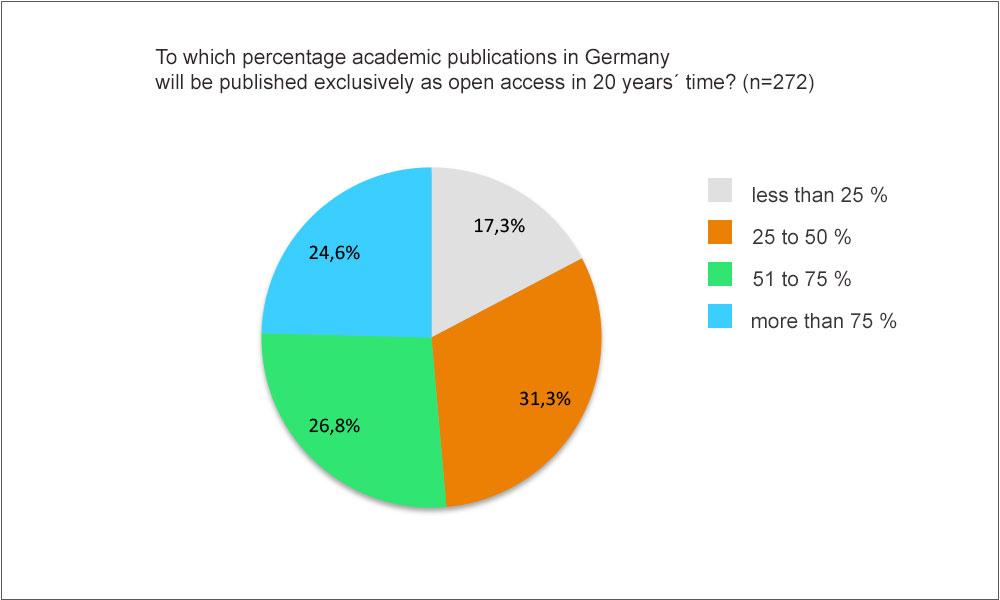
Open Data, Open Access, New Formats for Publications: The Future for Economics Research?
What does the future of research and publishing look like? Views of what changes open science will bring in the future vary according to the field in question. We conducted a survey of economics researchers to find out their view of its impact on the economics sciences.
In February 2017, a questionnaire drawn up by the ZBW – Leibniz Information Centre for Economics asked researchers from the economics sciences for their views about the future of research and publication in 20 years’ time. 234 people took part.
The questions were inspired by the ZBW – Leibniz Information Centre for Economics’ own young researchers’ ideas about the digitalisation of science.
Here are the opinions of the economists who took part in this survey on the environment for research and publication in 2037:
Open access speeds up process of research
Over half of those surveyed believe that in 20 years’ time more than 50 per cent of publications will be published exclusively as open access. However, 80 per cent of those questioned consider that over a quarter of academic publications will be published exclusively as open access. An overwhelming majority (almost 80 per cent) think that open access will speed up the process of research in the future because it will make research results available more quickly.

Open Data gradually becoming more important
Almost 40 per cent of those questioned believe that in 2037 more than half of research data will be published and shared, and over 70 per cent think more than a quarter of research data will be published and shared. However, the majority of those surveyed are sceptical about the question of a single integrated infrastructure. The question: “Will a single interdisciplinary infrastructure for research data exist as a universal access point for this in 2037” was answered in the negative by a good 76 per cent in the survey.
Citizen science not of critical importance
Economics academics consider the idea of citizen science to be not particularly important. The suggestion that in 20 years’ time citizen science will have been adopted across all disciplines as a model for collaboration in research is not true in their eyes. A clear majority of 80.5 per cent answered this question in the negative.
New formats for publications and alternative metrics take hold
The majority of those questioned have faith in new, open formats for publications and the use of alternative metrics to evaluate scientific output. 53.6 per cent of those surveyed think that PDFs will no longer be the predominate format for publications in 2037. Furthermore, 57.9 per cent assume that the impact factor will then fall into disuse as an indicator.
Open science as an integral part of the rewards system for academics
201 of the 234 respondents assume that in 2037 two or more open science activities will be taken into account during application procedures for posts. These include open peer reviewing, generation and sharing of research data, blogging, tweeting and uploading academic videos. Open science components would then be deployed in full by the reward system for academics.
Hardly any change to reviewing and environment for research
Only a minority believe there will be a change to the peer review process, transparency in the awarding of funding and a results-orientated environment for research.
The idea that there will be financial rewards for reviewing work is only believed by 39.2 per cent of those asked. Furthermore, 72.5 per cent answered the question, of whether financial rewards would lead to an increase in the quality of reviews, in the negative.
Only 36.8 per cent of those questioned consider that in 2037, there will be transparency in the awarding of funding, that applications for projects approved and the evaluations of these will be viewable. Similarly, only a minority of 34.4 per cent of those questioned believe that the research environment will be less reputation-orientated and more results-orientated by then.
Economics researchers believe change to systems will be slow
Overall, academics seem to believe there will be a change towards open science. However, this change will proceed somewhat slowly. The conditions surrounding research, such as the award of funding or the provision of a single integrated infrastructure for research data, will, in the opinion of the economists surveyed, not be so quick to change.
Skip to PDF content
Authors: Birgit Fingerle, Lisa Flieger, Dr. Doreen Siegfried (ZBW – Leibniz-Informationszentrum Wirtschaft)
View Comments

Research tools: From A for Altmetrics, B for Bench Work to C for Collaboration
Maintaining an overview of tools that support scientists in their work is difficult...



